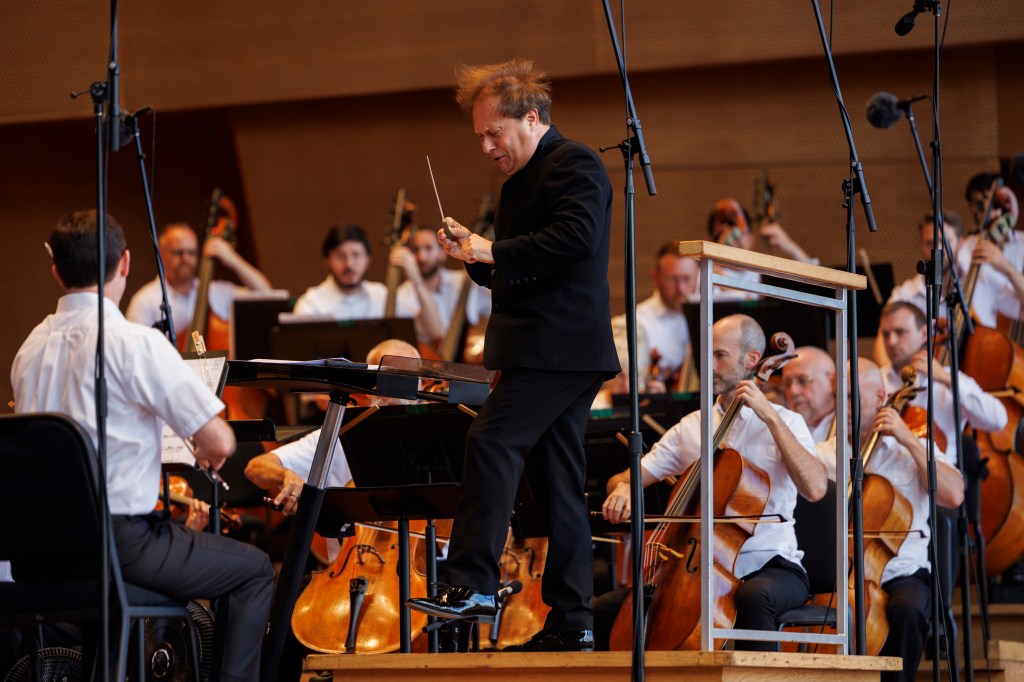After two weeks led by outgoing music director Carlos Kalmar, the Grant Park Music Festival is heating up the search for his successor, in progress since he announced his departure in 2021.
The tell? Rather than its usual mosaic of one-off podium guests, this summer’s lineup invites just a few conductors to lead multi-program engagements: Ludovic Morlot, Giancarlo Guerrero and Eric Jacobsen. (Anthony Parnther is on the podium for more than one concert too, if in pops programs: a John Williams salute on July 19 and accompanying the rapper Common on July 20.)
Morlot, first up this week, fits the profile of a possible Grant Park chief. His eight-year, recording-rich tenure at the Seattle Symphony demonstrated a dogged fealty to 20th century literature — especially by fellow Frenchmen — and works by living composers. Their premiere recording of John Luther Adams’s “Become Ocean” became a sensation when it was released in 2014, with the piece winning the music Pulitzer and reportedly moving Taylor Swift to donate $50,000 to the Seattle Symphony.
For all his credentials, Morlot’s connection with our own Grant Parkers never sparked on Wednesday — at least, not in standard repertoire. It’s hard to make Richard Strauss sound beige, but the “Rosenkavalier” suite somehow came out sounding like a khaki clearance rack, starting ponderously and progressing with a curious lack of sentimentality. Morlot cooled the ardency of the instrumental setting of “Hab’ mir’s gelobt” — “Der Rosenkavalier’s” climactic trio, in which an aging aristocrat cedes her younger lover to an age-appropriate woman. That might have worked in any other reading, but in Morlot’s dispassionate interpretation, one of Western opera’s most moving scenes felt like business as usual.
Transitions also presented consistent snags. Morlot and the orchestra butted heads in tempo disagreements a couple times in the second half of the suite, and again at the top of the second movement of Haydn’s “London” Symphony No. 104.
Though nearly as different from “Rosenkavalier” as the canon will allow, the Haydn symphony took the same hits as Morlot’s Strauss by choosing politesse over personality. The furious ending of the finale sounded like a mere annoyance, and even easy wins in classical repertoire, like exaggerating hot-cold dynamic contrasts for effect, went largely unseized.
Neither were any blight on the Grant Park Festival Orchestra, which sounded as fine as ever. The ensemble lunged for the gleaming, gutsy sound one yearns for in Strauss, and contoured the Haydn’s elegant and idiomatic phrasing — all their doing, seeing as Morlot’s gestures were more or less undifferentiated between both works.
Concertmaster Jeremy Black filled in some of Morlot’s blanks from the podium with emphatic physical cues that kept the orchestra on track, topped by a sweetly teasing solo in “Rosenkavalier’s” waltz section. So, to whatever member of the orchestra greeted his onstage entrance on Wednesday with a whoop: co-signed.
A festival commission by Clarice Assad, “Water Nymphs,” made off as the evening’s unqualified success. Few composers marry sophistication and charisma like Assad, and this five-minute opener — dedicated to her two young daughters — was more of the same from the Chicago-based Brazilian American composer. Debussyian textures give way to glittering pointillism in pizzicato strings and piano, then a lopsided dance. All the while, bent pitches wail across the orchestra. The piece ends with a mighty surge, like being submerged by rolling surf.

Morlot and the festival orchestra gelled best here all evening, a testament to his affinity for new music. Together, they tightened some of the piece’s more delicate sutures, bringing out the plucky mischief of the pointillist section and, at one point, the tightrope precision of a quarter-tone unison between solo cello and trumpet.
Four chances remain to hear the Morlot-Grant Park match in action, spanning from an underappreciated oddity (Kodály’s “Psalmus Hungaricus”) to more contemporary fare (Angélica Negrón’s “Color Shape Transmission” and Arturo Márquez’s “Fandango”). There’s always a chance Wednesday was just a warmup.
“Stravinsky Petrushka,” 6:30 p.m. June 28 and 7:30 p.m. June 29 indoors at the Harris Theater, 205 E. Randolph St.; free, www.grantparkmusicfestival.com
“Tchaikovsky Symphony No. 6,” 6:30 p.m. July 3 and 5, Jay Pritzker Pavilion at Millennium Park, 205 E. Randolph St.; free, www.grantparkmusicfestival.com
Hannah Edgar is a freelance critic.
The Rubin Institute for Music Criticism helps fund our classical music coverage. The Chicago Tribune maintains editorial control over assignments and content.


